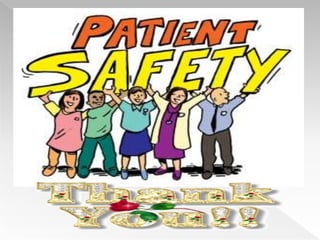Medication error
- 1. RAHIMA M . SALENDAB NQMC,MGH, MADINA
- 3. Causes for errors: Too many telephone calls Overload/ week ends Too many Patients Lack of concentration No one available to double check Staff shortage Similar drug names No time to counsel Illegible prescription Misinterpreted prescription
- 4. ADVERSE DRUG EVENT : Any injury caused by the use (or non use) of a drug. AN ERROR OF COMMISSION: Is something that happen from administration of the medication for example : giving the wrong medication
- 5. An error of omission occurs when the administration process is not completed for example: not administering an ordered medication.
- 6. TYPE OF MEDICATION ERROR 1. PRESCRIBING ERRORS . 2. OMISSION ERRORS. 3. WRONG TIME ERRORS. 4. UNAUTHORIZED DRUG ERRORS. 5. IMPROPER DRUG ERRORS . 6. WRONG DOSE FORM ERRORS. 7. WRONG DOSE PREPARATION ERRORS. 8. WRONG ADMINISTRATION TECHNIQUE ERRORS . 9. DETERIORATED DRUG ERRORS . 10.MONITORING ERRORS . 11.COMPLIANCE ERRORS .
- 7. Occurs when prescriber orders drug for specific patient drug dose dosage form route of administration length of therapy number of doses administration drug concentration inadequate or incorrect instructions for use illegible handwriting
- 8. Failure to administer an ordered dose (not late dose). Omitted dose is not an error when: cannot take anything by mouth (NPO). providers are waiting for drug level results. patient refuses.
- 9. Standardized administration times Acceptable interval surrounding scheduled time. Occasionally unavoidable: patient is away care area for test. medication is not available at time it is due.
- 10. Administration of medication to patient without proper authorization by prescriber. Medication for patient given to another patient. Nurse gives medication without prescriber order. Patients “share” prescriptions.
- 11. Dose that is greater or less than prescribed dose. Can occur when additional dose is administered Delay in documenting dose Absence of documentation Inaccurate measurement of oral liquid Exclusions from this error type
- 12. Doses administered as different form than ordered.
- 13. Using bacterio static saline instead of sterile water to reconstitute lyophilized powder for injection.
- 14. Examples: Subcutaneous injection that is given too deep Intravenous (IV) drug is allowed to infuse via gravity instead of using an IV pump. Instilling eye drops in wrong eye.
- 15. Monitoring expiration dates is very important. Refrigerated drugs stored at room temperature may decompose & lose efficacy.
- 16. Inadequate drug therapy review. Examples: Ordering serum drug levels but not reviewing them. Not ordering drug levels when required. Prescribing antihypertensive agent & then failing to check blood pressure.
- 17. Failure to adhere to prescribed drug regimen. Example: Patient does not complete antibiotics therapy-saves a few doses.
- 18. Errors that cannot be placed into category. Examples: Medication dispensed without adequate patient education.
- 20. 1. Human factors. 2. Systems. 3. Abbreviations. 4. Oral orders. 5. Look-alike and sound-alike drugs. 6. Dosage calculation. 7. At-risk drugs
- 21. Abbreviation Intended Misinterpretation > and < Greater than Less than Often used the Opposite Μg Microgram Mistaken as mg IU international Unit Mistaken as IV qd, QD or QOD Every day or every Often confused for other day each other cc cubic centimeter Misread as ‘u’ Zero after decimal(1.0) 1 mg Misread as 10 mg Zero not written before Half mg (0.5) Misread as 5 mg decimal (.5mg)
- 22. Types of Verbal Order Errors Wrong Drug Clonidine misheard as Klonopin Amiodarone misheard as amrinone Wrong Dose 15 mg misheard as 50 mg 2 mg misheard as 20 mg Wrong Labs Blood glucose misheard as 257 instead of 157 patient received 6 units of insulin instead of 2.
- 23. NURSING RESPONSIBILITIES Only administer meds you have prepared. Know the purpose and expected outcomes. Do not leave meds at bedside. Check ID band before administering. Some meds need checking by another nurse. Consult with supervisor or Dr if dosage is outside of recommended range . Do not administer medications calculated by someone else except pharmacist .
- 24. STANDARD PRECAUTION Wash hands before beginning medication Wear gloves for parenteral injections Wear gloves if helping put pills in mouth
- 27. SAMPLE OF ILLEGIBLE HAND WRITING
- 29. 7 RIGHTS OF MEDICATION ADMINISTRATION RIGHTPATIENT RIGHT DRUG RIGHT DOSE RIGHT ROUTE RIGHT TIME RIGHT FREQUENCY RIGHT DOCUMENTATION
- 30. SOUND ALIKE Folinic Acid Folic Acid Amidaron Amlor Zinnat Zantac Concor Zocor Tazocin Prazocin Kafocid Keflex Lasix Losec Aldactone Aldomet Ranitidine Loratidine voltarin ventolin
- 31. HOW TO PREVENT MEDICATION ERROR????? When your doctor gives you a prescription, ask him or her to tell you the name of the drug, the correct dosage, and what the drug is used for. Be sure you understand the directions for any medications you may be taking including the correct dosage, storage requirements, and any special instructions. Finally, never be hesitate to ask questions. If the name of the drug on your prescription looks different than you expected, if the directions appear different than you thought, or if the pills or medication itself looks different, tell your doctor or Pharmacist right away. Asking questions if you have any suspicions at all is a free and easy way to ensure that you don't become the victim of a medication error.
- 32. NO ONE CAN MOTIVATE…. Just because you cannot do it TODAY IF YOU ARE NOT WILLING TO DO YOUR SELF… Does NOT mean you will not do it SOMEDAY If you are not willing to learn, No one can help you. If you are determined to learn, No one can stop you …!!

































